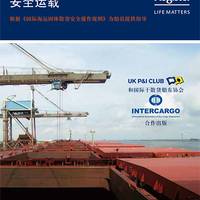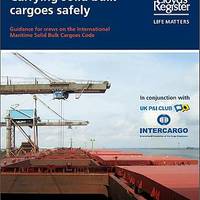LR Alert: Liquefaction Dangers for Carriage of Bauxite
The IMO’s Carriage of Cargo and Containers (CCC) Sub-Committee has published circular CCC.1/Circ.2 on Carriage of Bauxite that may Liquefy. the Master is presented with an assessment that the cargo does not present Group A properties. This advice follows findings from the Bulk Jupiter accident investigation, which have triggered the re-assessment of the cargo. The conclusions of this re-assessment will be included in future amendments to the IMSBC Code. Currently, bauxite is assessed as a Group C cargo (cargoes not liable to liquefaction) under the Code. Lloyd's Register, the UK P&I Club, and Intercargo have produced a pocket guide for ships' officers and agents who arrange cargoes for loading.
LR Alert: Amendments to the IMSBC Code

Amendments to the International Maritime Solid Bulk Cargoes (IMSBC) Code (03-15) are under development by the Carriage of Containers and Cargoes (CCC) Sub-Committee (formerly the DSC Sub-Committee). Member governments are urged to voluntarily implement the amendments as soon as possible. a new draft test procedure – "Modified Proctor/ Fagerberg test procedure for iron ore fines" – for inclusion in appendix 2 to the IMSBC Code. Owners and Masters are reminded that cargoes with a moisture content higher than the Transportable Moisture Limit (TML) must not be accepted for loading.
Solid Bulk Cargos Safety Guide Now in Chinese

International Maritime Solid Bulk Cargos (IMSBC) Code pocket checklist will be available at Marintec 2013 next week. Lloyd’s Register, UK P&I Club, and Intercargo produced a pocket guide and checklist earlier this year for ships’ officers and agents who arrange cargos for loading. When bulk cargos shift, liquefy, catch fire or explode due to poor loading procedures, the consequences can be critical – ships could capsize, lose stability or sustain severe structural damage. Now the pocket checklist…
Bulk Cargo IMSBC Code Requirements
A review of recent incidents has highlighted a failure of not only ship’s crew, but also charterers and shippers, to comply with the mandatory requirements of the International Maritime Solid Bulk Cargoes (IMSBC) Code. The IMSBC Code became mandatory for all SOLAS vessels carrying solid bulk cargoes from January 1, 2011. The operators of these vessels must ensure that cargoes are loaded and carried in accordance with the requirements of the IMSBC Code to maintain the structural integrity of the vessels and safety of the crew at all times. It is the responsibility of cargo vessel operators to ensure that all cargoes are carried in accordance with the requirements of their classification society. The consequences of failure to comply with the Code can be considerable.
Bulk Cargo Loading Instant Prompt Published

UK P&I Club, Lloyd's Register and Intercargo have produced a pocket guide & checklist for ship's officer and agents who arrange cargoes for loading. The P&I Club explains that when bulk cargoes shift, liquefy, catch fire or explode as a consequence of poor loading procedures, the consequences can be massive. Ships may capsize, lose stability or sustain severe structural damage. Such happenings enhance the risks - and the occurrence - of death, injury, insurance claims, operational delay and considerable expense.
UK P&I Club Pocket Guide for Safe Carriage of Solid Bulk Cargoes
When bulk cargoes shift, liquefy, catch fire or explode as a consequence of poor loading procedures, the consequences can be massive. Ships may capsize, lose stability or sustain severe structural damage. Such happenings enhance the risks and occurrence of death, injury, insurance claims, operational delay and considerable expense. This prompted the UK P&I Club, Lloyd’s Register and Intercargo to produce a pocket guide and checklist for ships’ officers and agents who arrange cargoes for loading. Carrying solid bulk cargoes safely: Guidance for crews on the International Maritime Solid Bulk Cargoes Code outlines the precautions to be taken before accepting solid bulk cargoes for shipment…
GL Launches Pocket Guide for MLC 2006
With a sweeping reach and wide ranging application the Maritime Labour Convention, 2006 (MLC 2006) will have a significant impact on shipowners, managers, crewing agencies and most importantly the seafarers on-board. At its entry into force the MLC 2006 will alter some 37 ILO conventions and require the certification of over 55,000 seagoing vessels. Preparing for this sea change will require a massive adjustment. To support the maritime industry in this endeavour Germanischer Lloyd (GL) has developed an easy to use Pocket Guide on the MLC 2006. Alongside GL's E-Learning tool on the Convention the new Pocket Guide is part of a set of tools to make the implementation of the MLC 2006 as smooth, transparent and comprehensible as possible.
Coast Guard Offers Resources on Hazardous Materials
The United States Coast Guard has published a free resource CD-ROM that brings comprehensive chemical information to the fingertips of fire and safety service personnel responding to a hazardous materials incident. Users can search the database by a substance's color, odor, and physical appearance and use the data to plan for a safe and effective response. Chemicals are rated according to health risk, flammability, and reactivity, among other factors, using data from several sources. The CD-ROM, known as CHRIS+, contains several databases of chemical, physical, thermodynamic, toxicological, and fire properties. Weapons of Mass Destruction (WMD) First Responder's Guide, the Coast Guard's advice for responders to WMD incidents.







